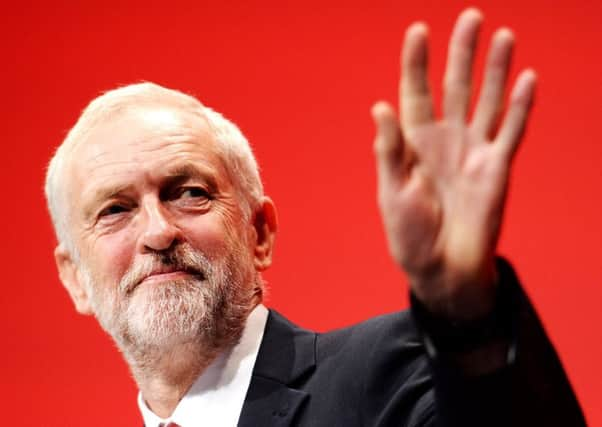Scott Macnab: The battle for the '˜anti-politics' vote


Jeremy Corbyn’s visit to Scotland last week showed that the recent leadership triumph has only bolstered his determination to do things his way and not “play the game” of politics.
The UK Labour leader was in Glasgow on Thursday night to deliver the Jimmy Reid Memorial Lecture, arriving hotfoot off the early evening shuttle from London to address a sell-out crowd of 500 (paying a tenner each). It was a worthy speech about the failings of neo-liberal economic modelling, but hardly likely to trouble the shorthand of journalists present. We were far more interested in the cabinet reshuffle which he had instigated before leaving London.
Advertisement
Hide AdAdvertisement
Hide AdBut requests for media interviews were politely declined, including the cursory soundbite for TV which is the norm on these occasions. And it’s not hard to see why Crobyn and his people don’t feel they need to worry about such things. Such was the rapturous response from a packed Govan Old Parish church on a chilly evening from the hundreds present, why should he? He is clearly the UK politician, above all others, who has tapped into the anti-politics, anti-establishment sentiment which has swept across Western democracies after the financial crash.
It hasn’t been restricted to the rise of left-wing parties. The rise of Donald Trump, until last week anyway, is widely seen a backlash against political elites across the Atlantic, as was the strength of socialist Bernie Sanders’ campaign for the Democratic nomination in the US Presidential race. Across Europe, recent years have seen the rise of the hard-left Podemos in Spain, aimed at ensuring the country does not become a “colony” of Germany and the EU Troika after its rescue package from the European Stability Mechanism, while the leftist Syriza took power on the back of the crippling austerity imposed in Greece. Eastern Europe has seen the far right Jobbik party enjoy success in Hungary, while Poland saw a surge in support for the Law and Justice party and the Congress of the New Right.
But the culmination of the rising anti-establishment fervour across the west came here in the UK earlier this summer with the political earthquake which saw Britons defying the exhortations of Government, the main opposition parties, numerous experts and academics by voting to leave the EU.
Corbyn’s victory in the recent Labour leadership contest was also achieved despite widespread rejection from his own MPs at Westminster, commentators and academics about the veteran left-winger’s chances of ever becoming Prime Minister. The political establishment may have said No to Corbyn, but the people, within Labour at any rate, said Yes. Except, perhaps, in Scotland.
Shadow Chancellor John McDonnell acknowledged immediately after Corbyn’s re-election that his leadership rival Owen Smith had probably won north of the border. The reason, McDonnell explained, was that the SNP was the party in Scotland which had tapped into the anti-austerity, even anti-establishment (in this case Westminster establishment) sentiment which was at the core of Corbyn’s support south of the border.
When Prime Minister Theresa May decided to blame Nicola Sturgeon in part for the Brexit vote ahead of the Tory conference it seemed a strange intervention. The SNP had become such a part of the governing establishment at Holyrood, Mrs May argued, that it was now part of the political elite which Brexit voters were standing up against in the EU referendum. Ms Sturgeon was certainly at the heart of the Remain campaign. She effectively led this north of the border and was a central figure in the wider campaign throughout the UK. The First Minister made it clear she did not want to see a Brexit vote even if, as turned out to be the case, it revived the campaign for Scottish independence. But the result in Scotland was hardly a rejection of Ms Sturgeon’s position with 62 per cent of voters wanting to stay in the EU. The anti-politics groundswell in Scotland, for time being anyway, is still kicking against a different elite which is now under Mrs May’s auspices.
The Scottish independence campaign of 2014 sparked to life in its final six months thanks to the success of grassroots groups like the Radical Independence Campaign (RIC) in disaffected heartlands like housing schemes of Glasgow and the wider west of Scotland. It helped transform the Yes campaign from a political campaign to a movement. But as Nicola Sturgeon this week faces delegates at the first SNP conference since the party’s Holyrood election triumph in May and the Brexit vote the following month, she faces a growing dilemma. How long can the SNP continue to capitalise on the anti-politics sentiment in Scotland while increasingly being seen as the natural party of government? It’s simply inevitable that the longer they stay in office and are forced to grapple with the compromises that brings, the harder it becomes to be seen as a fresh alternative to the established order. And to keep the grassroots happy. Let’s not forget that the decade-long anniversary of the SNP’s reign in power is barely six months away.
Ms Sturgeon’s announcement last month that the SNP will undertake a nationwide consultation exercise aimed at winning over wavering No voters from 2014 may keep the referendum-hungry natives at bay when they congregate in Glasgow tomorrow. But the dices are rolling again on the constitutional issue. Deputy leadership contender Tommy Sheppard warned last weekend of caution among activists about rushing into a second referendum. Does Ms Sturgeon seize the moment, as people like her predecessor Alex Salmond advocate, or adopt the more gradualist approach and let Brexit negotiations take their course? And all the while younger opposition leaders at Holyrood are turning up the heat on the SNP over cuts to local government, colleges and mental health funding. The credibility of the Nationalists’ anti-establishment rhetoric may increasingly start to crack.